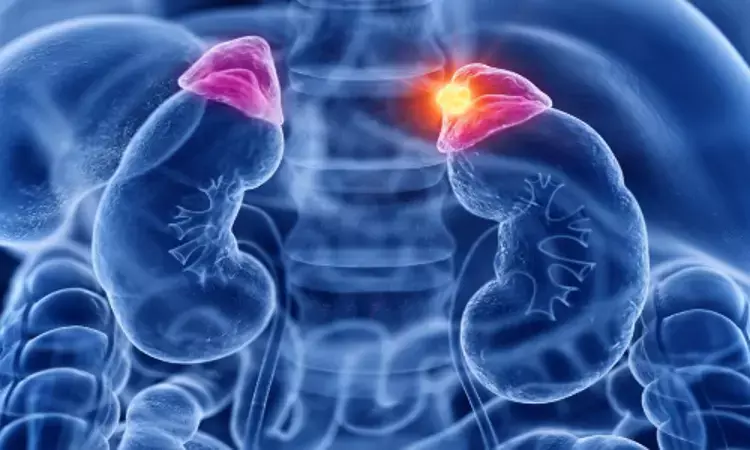- Home
- Medical news & Guidelines
- Anesthesiology
- Cardiology and CTVS
- Critical Care
- Dentistry
- Dermatology
- Diabetes and Endocrinology
- ENT
- Gastroenterology
- Medicine
- Nephrology
- Neurology
- Obstretics-Gynaecology
- Oncology
- Ophthalmology
- Orthopaedics
- Pediatrics-Neonatology
- Psychiatry
- Pulmonology
- Radiology
- Surgery
- Urology
- Laboratory Medicine
- Diet
- Nursing
- Paramedical
- Physiotherapy
- Health news
- Fact Check
- Bone Health Fact Check
- Brain Health Fact Check
- Cancer Related Fact Check
- Child Care Fact Check
- Dental and oral health fact check
- Diabetes and metabolic health fact check
- Diet and Nutrition Fact Check
- Eye and ENT Care Fact Check
- Fitness fact check
- Gut health fact check
- Heart health fact check
- Kidney health fact check
- Medical education fact check
- Men's health fact check
- Respiratory fact check
- Skin and hair care fact check
- Vaccine and Immunization fact check
- Women's health fact check
- AYUSH
- State News
- Andaman and Nicobar Islands
- Andhra Pradesh
- Arunachal Pradesh
- Assam
- Bihar
- Chandigarh
- Chattisgarh
- Dadra and Nagar Haveli
- Daman and Diu
- Delhi
- Goa
- Gujarat
- Haryana
- Himachal Pradesh
- Jammu & Kashmir
- Jharkhand
- Karnataka
- Kerala
- Ladakh
- Lakshadweep
- Madhya Pradesh
- Maharashtra
- Manipur
- Meghalaya
- Mizoram
- Nagaland
- Odisha
- Puducherry
- Punjab
- Rajasthan
- Sikkim
- Tamil Nadu
- Telangana
- Tripura
- Uttar Pradesh
- Uttrakhand
- West Bengal
- Medical Education
- Industry
SGLT-2 inhibitors tied to lower risk of End-Stage Renal Disease, Finds Study

Researchers have noted that the initiation of SGLT-2i vs oGLD was associated with a lower risk of End-Stage Renal Disease (ESRD) and all-cause death, according to a recent study published in the Journal of Diabetes, Obesity, and Metabolism.
Many randomized trials have demonstrated a lower risk of cardiovascular (CV) events with sodium-glucose cotransporter-2 inhibitors (SGLT-2i) in patients with type 2 diabetes (T2D) at high CV risk. Also, prior real-world data suggested similar SGLT-2i effects in T2D patients with a broader risk profile, but these studies focused on heart failure and death.
However, real-world evidence from routine clinical practice elucidating the effects of sodium-glucose cotransporter-2 inhibitors (SGLT-2i) on renal outcomes and mortality in patients with type 2 diabetes (T2D) is limited. Hence, Eun Sil Koh and colleagues from the Division of Nephrology, Department of Internal Medicine, Yeouido St. Mary's Hospital, Seoul, Republic of Korea conducted the present study on Korean patients with T2D.
Using data from the Korean National Health Insurance Service database, the authors studied a total of 701,674 patients who were identified with T2D. "We divided these patients into new-users of SGLT-2i and new-users of other glucose-lowering drugs (oGLD). Using propensity scores, patients in the two groups were matched 1:1. We examined the risk of end-stage renal disease (ESRD) and all-cause death", Koh describes.
Out of the total sample size, 45,016 patients were included in each group, and baseline characteristics were well-balanced between all groups.
The key findings observed were-
- Use of SGLT-2i versus oGLD was associated with a lower risk of ESRD and all-cause death
- In a subgroup analysis by eGFR, initiation of SGLT2i vs oGLD was associated with a lower risk of progression to ESRD among patients with eGFR 60-90 and <60 ml/min/1.73m2 and lower risk of all-cause death associated with SGLT-2i versus oGLD in patients with eGFR ≥90 and 60-90 ml/min/1.73m2.
Therefore, the authors concluded that "in this large nationwide study of Korean patients with T2D, initiation of SGLT-2i vs oGLD was associated with a lower risk of ESRD and all-cause death."
Dr. Nandita Mohan is a practicing pediatric dentist with more than 5 years of clinical work experience. Along with this, she is equally interested in keeping herself up to date about the latest developments in the field of medicine and dentistry which is the driving force for her to be in association with Medical Dialogues. She also has her name attached with many publications; both national and international. She has pursued her BDS from Rajiv Gandhi University of Health Sciences, Bangalore and later went to enter her dream specialty (MDS) in the Department of Pedodontics and Preventive Dentistry from Pt. B.D. Sharma University of Health Sciences. Through all the years of experience, her core interest in learning something new has never stopped. She can be contacted at editorial@medicaldialogues.in. Contact no. 011-43720751
Dr Kamal Kant Kohli-MBBS, DTCD- a chest specialist with more than 30 years of practice and a flair for writing clinical articles, Dr Kamal Kant Kohli joined Medical Dialogues as a Chief Editor of Medical News. Besides writing articles, as an editor, he proofreads and verifies all the medical content published on Medical Dialogues including those coming from journals, studies,medical conferences,guidelines etc. Email: drkohli@medicaldialogues.in. Contact no. 011-43720751


